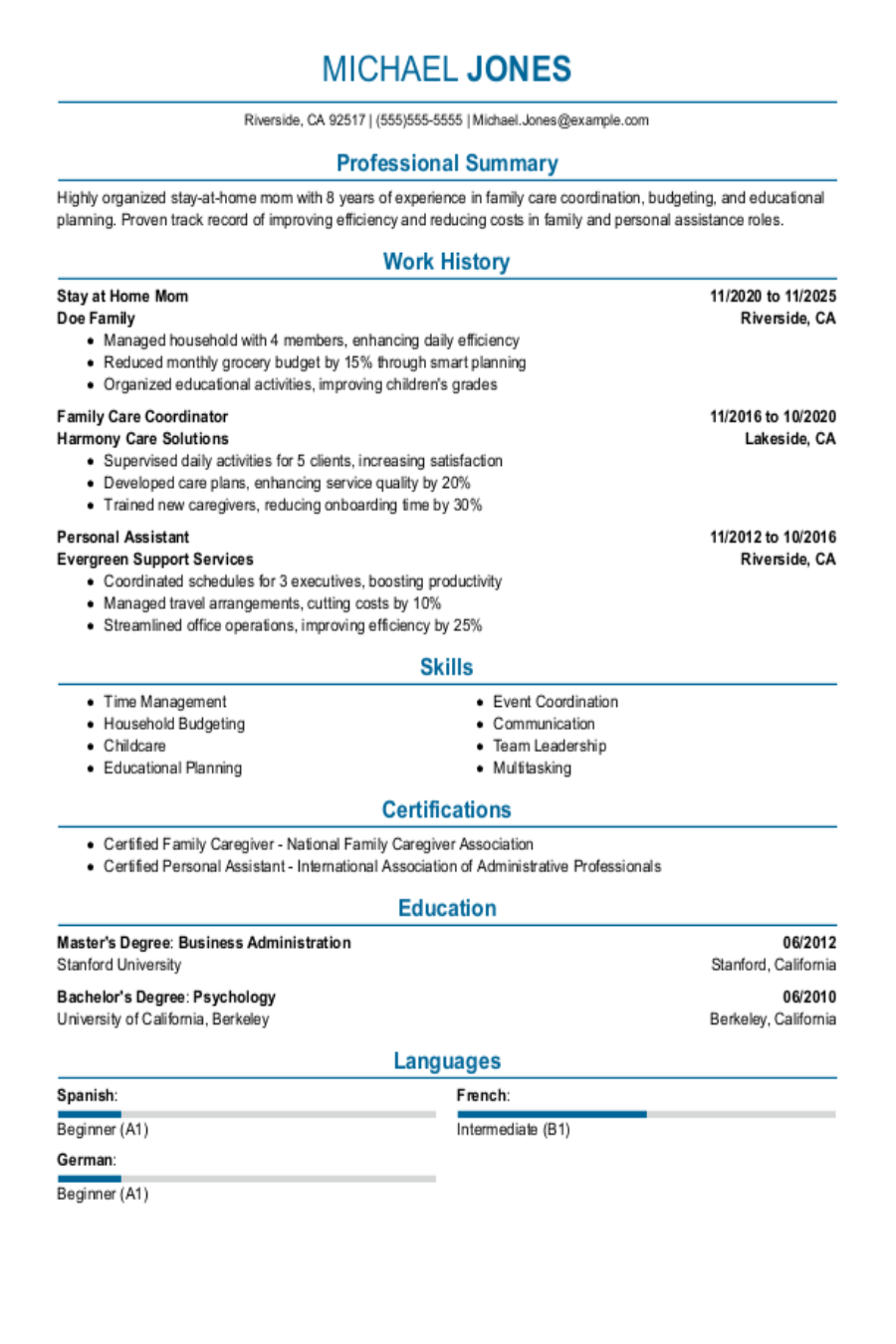Popular Gis Analyst Resume Examples
Entry-level GIS analyst resume
An entry-level resume for a GIS analyst should highlight relevant coursework, technical skills in mapping software, internships, and projects to showcase analytical abilities despite limited experience.
Places skills over experience: Using a functional resume format is strategic for this GIS analyst because it highlights key skills like spatial data analysis and software skill, focusing on relevant accomplishments rather than limited chronological experience.
Showcases education: This resume builds the candidate’s credibility by placing a strong focus on their educational background.
Mid-career GIS analyst resume
A mid-career GIS analyst resume should emphasize a combination of technical expertise, project experience, and continuous learning to effectively demonstrate skill and adaptability in the evolving geospatial field.
Employs active language: Action verbs like "improved," "integrated," and "developed" highlight a proactive approach and significant contributions in the GIS field.
Encourages quick scanning: A streamlined layout and well-defined sections make it easy for hiring managers to quickly identify relevant qualifications and achievements, showcasing the job seeker's strengths effectively.
Experienced GIS analyst resume
An experienced GIS analyst resume should highlight technical skills, project success stories, and relevant certifications to effectively demonstrate career growth and expertise in the field.
Quantifies achievements: Quantifiable achievements enable GIS analysts to clearly showcase their impact on projects and processes. By presenting metrics, such as a 40% reduction in processing time or improving data accuracy, this job seeker makes their contributions tangible and easily recognizable by recruiters.
Embraces modern design: This modern resume template effectively showcases the GIS analyst's innovative approach, emphasizing their commitment to precision and excellence in geospatial data management and application development.
No experience GIS analyst resume
A resume for an applicant with no experience aiming to become a GIS analyst should highlight relevant coursework, technical skills in mapping software, and any volunteer projects that showcase the ability to effectively analyze geographic data.
Leads with education: Prominently featuring their degrees and highlighting academic achievements in the accomplishments section helps establish this candidate's expertise.
Avoids jargon: Job seekers often think that using complex terminology can improve their resumes. However, a straightforward and clear approach is far more effective in showcasing their skills and experiences.
Gis Analyst Resume Template
Looking to create a standout application? This GIS analyst resume template serves as an excellent foundation—just fill it in with your personal details and experience.
Suki Lee
Cedar Valley, MN 55129
(555)555-5555
Suki.Lee@example.com
Professional Summary
Experienced GIS Analyst with expertise in geospatial analysis, remote sensing, and data management. Proven track record of increasing map accuracy by 20% and developing over 15 GIS models. Skilled in ArcGIS software, spatial databases, and automation, leading to a 15% efficiency gain.
Work History
GIS Analyst
GeoInsights Corp - Cedar Valley, MN
September 2023 - October 2025
- Increased map accuracy by 20% with data analysis
- Developed 15+ GIS models for urban planning projects
- Streamlined data collection process saving 10 hours/week
Spatial Data Specialist
EarthMap Solutions - Minneapolis, MN
September 2020 - August 2023
- Designed 50+ complex spatial databases
- Enhanced data retrieval speed by 30% with indexing
- Automated workflow processes resulting in 15% efficiency gain
Cartographic Technician
MapLogic Enterprises - Cedar Valley, MN
September 2019 - August 2020
- Created 100+ digital maps for public use
- Reduced data entry errors by 25% through QA processes
- Collaborated with team to develop 10 dynamic map templates
Languages
- Spanish - Beginner (A1)
- French - Intermediate (B1)
- German - Beginner (A1)
Skills
- Geospatial Analysis
- Remote Sensing
- Data Management
- Spatial Database Management
- Cartography
- ArcGIS Software
- Python for GIS
- SQL Querying
Certifications
- Certified GIS Professional - GIS Certification Institute
- ArcGIS Desktop Professional - Esri
Education
Master of Science Geographical Information Science
University of Texas Austin, TX
June 2019
Bachelor of Science Geography
Texas A&M University College Station, TX
June 2017
Must-Have Skills on a GIS Analyst Resume
A strong skills section is essential for showcasing your capabilities in any resume.
This data outlines the most prevalent hard and soft skills for a GIS analyst based on insights from Resume Now’s internal resume database.
When you’re ready to improve your resume with skills, check out our AI Resume Skills Generator. It provides tailored suggestions for both hard and soft skills that align with your job title, helping you create a comprehensive and individualized skill profile.
Writing Your GIS Analyst Resume
Having explored these effective resume examples, you’re now prepared to dive into the process of how to write a resume. We’ll take it step by step, guiding you through each section for a polished final product.
List your most relevant skills
An effective skills section on your GIS Analyst resume should showcase your skill in tools like ArcGIS, QGIS, and data analysis while also emphasizing your problem-solving abilities and communication skills. By doing this, you demonstrate how well you align with the responsibilities of a GIS Analyst.
To optimize your chances of getting noticed, use keywords from the job listing throughout your skills section. This strategy helps human recruiters quickly see that you're a fit for their needs, while also ensuring that applicant tracking systems recognize you as a qualified job seeker.
Example of skills on a GIS analyst resume
- Proficient in using GIS software (ArcGIS, QGIS) for spatial analysis and map creation
- Adept in managing and analyzing complex datasets to inform decision-making
- Strong communicator with the ability to convey technical information clearly
- Collaborative team player with a proactive approach to problem-solving
Emphasizing your soft skills on your resume can set you apart from other applicants. While technical expertise is important, interpersonal abilities are valuable to employers because they foster teamwork and collaboration, making them hard to teach in the workplace.
Highlight your work history
Your work experience section should demonstrate how you've effectively used your skills, making your resume stand out to potential employers.
For each position you include, be sure to provide essential details such as your job title, the employer's name, and the dates you were employed. This information helps establish your professional credibility and allows employers to quickly assess your relevant experience in GIS analysis.
Example of a GIS analyst work experience entry
- GIS Analyst
GeoTech Solutions - Denver, CO
January 2021 - Present - Develop and maintain detailed geographic information system (GIS) databases to support project planning and analysis, improving data accessibility by 30%
- Conduct spatial analysis to identify trends and patterns, providing actionable insights that informed decision-making processes for urban development projects
- Collaborate with cross-functional teams to create visual maps and reports, improving stakeholder engagement and communication effectiveness by 25%
- Train colleagues on GIS software usage and best practices, resulting in increased team efficiency and a smoother workflow across departments
- Present findings at quarterly meetings, receiving positive feedback from management for clarity of data interpretation and relevance to strategic goals
Aim for clarity in your resume bullet points. Use precise language that highlights your achievements without unnecessary detail. Focus on what you accomplished and how it benefited your team or project to keep it strong yet concise.
Include your education
The education section of your GIS analyst resume should list your degrees and diplomas in reverse-chronological order, starting with the most recent. Include any relevant certifications and exclude your high school diploma if you have a bachelor's degree or higher. Highlighting honors or special projects can also strengthen this section.
If you are still pursuing your degree or if it is incomplete, be sure to mention your highest completed level along with an expected graduation date. You might also want to include bullet points that emphasize key coursework or academic accomplishments relevant to GIS analysis.
Common certifications for a GIS analyst resume
- Geographic Information Systems Professional (GISP) – GIS Certification Institute
- Certified Geographic Information Systems Analyst (CGIA) – International Association of Geospatial Professionals
- Esri Technical Certification – Esri
- CompTIA Project+ for GIS – CompTIA
Sum up your resume with an introduction
Your profile section serves as a powerful first impression for your resume, setting the tone for what employers can expect from you.
Experienced job seekers should consider using a professional summary to emphasize their most significant achievements. This approach allows you to showcase your expertise and key contributions right at the beginning of your resume, helping hiring managers see your qualifications clearly and understand how you can add value to their organization.
If your professional experience is minimal, write a resume objective that shows your intent to grow and contribute.
Professional summary example
Analytical GIS analyst with over 5 years of experience in spatial data management and geographic information systems. Demonstrated success in improving data visualization, optimizing mapping processes, and supporting decision-making through precise analysis. Proficient in ArcGIS, remote sensing, and geospatial database management.
Resume objective example
Enthusiastic GIS analyst eager to leverage a solid foundation in geographic information systems and data analysis to support innovative mapping solutions for a forward-thinking organization. Committed to using strong analytical skills and attention to detail to improve project efficiency and drive strong decision-making.
When crafting your resume profile, start with your job title as a GIS Analyst. This method immediately conveys your professional identity to employers, highlighting your expertise in the field and clearly communicating who you are and what you do.
Add unique sections to set you apart
Optional resume sections can be a game-changer for your career as a GIS Analyst, allowing you to highlight what makes you unique. These sections provide an opportunity to showcase qualifications that might not fit neatly into the standard format.
By including elements like relevant hobbies or volunteer experiences, you give potential employers insight into your professional values and skills. For instance, if you've volunteered with environmental organizations or developed personal projects using GIS software, these details illustrate your dedication and passion for the field.
Three sections perfect for a gis analyst resume
- Technical Skills: As a GIS analyst, showcasing your technical skills is important. These competencies demonstrate your expertise in spatial analysis and data visualization, making you an attractive applicant to potential employers who seek skill in geographic information systems.
- Tools and Platforms: Strong computer skills are essential for GIS analysts. Being skilled in mapping software, data visualization tools, and spatial analysis platforms improves your ability to interpret geographic data effectively and support informed decision-making.
- Professional Certifications: Certifications showcase your expertise and dedication in GIS analysis. They validate your skills, improve job prospects, and keep you updated with the latest tools and technologies in the field.
5 Resume Formatting Tips
- Choose a format that matches your career stage.
Choosing the right resume format depends on your career level. If you're an experienced GIS analyst, a chronological format showcases your work history effectively. For those just starting out, consider a functional resume to highlight skills over experience. A combination format can also provide a well-rounded view of both skills and employment history.
- Pick a smart resume template.
Using a professional resume template is key for improving readability. It allows your skills and experiences to stand out at a glance. If you opt for a custom format, ensure it's clean and uses ATS-friendly fonts to keep your application accessible to hiring managers.
- Select an appropriate font.
Choose a professional font like Arial, Calibri, or Verdana for your resume. These fonts improve readability for both applicant tracking systems and hiring managers, helping your resume to stand out for the right reasons.
- Use consistent formatting.
Align your resume to the left and maintain uniform margins to create a polished and professional look that improves readability.
- Keep your resume to one or two pages.
When crafting your resume, keep in mind that resumes should be one page long to maximize impact. Focus on concise content that highlights your key skills and experiences, ensuring every word adds value to your application.
Tools for Your Job Search
Are you gearing up to apply for that exciting gis analyst position? Before you hit submit, take a moment to use our ATS Resume Checker. This essential tool provides you with insights on how your resume performs against the automated systems that many organizations use for initial screening.
Looking for an edge in crafting your resume? Our AI Resume Builder gives tailored recommendations specific to your geographic information systems expertise, along with professionally designed templates that effectively showcase your analytical skills and project experiences.
Frequently Asked Questions
Last Updated: October 10, 2025
Absolutely. A cover letter is important as it adds valuable context to your resume and establishes a connection with potential employers. It allows you to express your enthusiasm for the role and demonstrate how your skills as a GIS analyst make you an ideal job seeker. Don’t overlook this chance—write a cover letter that highlights your unique qualifications.
For a hassle-free approach, try our AI Cover Letter Generator. It will help you quickly create a customized, strong cover letter in just minutes. Plus, you can choose from various cover letter template options that align perfectly with your resume, ensuring a professional look and feel throughout your application.
A resume is generally a concise document, spanning one to two pages, that highlights your skills and experience relevant to the job you're applying for. In contrast, a CV (curriculum vitae) is more extensive and can be several pages long, providing detailed information about your academic achievements, research contributions, publications, and professional history.
You’ll typically use a CV when applying for positions in academia or specialized fields such as law or medicine. If you need help crafting an effective CV, our online CV Maker offers an easy solution. Choose from various tailored CV templates designed for different industries and career stages to create a standout CV in no time!
To craft a standout GIS analyst resume, select a polished, professional template and weave in essential keywords from the job description. This strategy will effectively showcase your qualifications and fit for the position.
Many GIS analysts start as junior analysts or technicians, gaining hands-on experience. With further training and certifications, they can advance to senior analyst roles or specialize in geographic information systems management.
As a GIS analyst, showcasing your commitment to continuous development is vital. You can do this by obtaining relevant certifications and listing any courses you have completed. Attend industry seminars, engage with professional literature, and keep up with informative podcasts. Joining professional associations also strengthens your profile and shows that you are dedicated to staying informed about the latest advancements in your field.
Was this information helpful? Let us know!
Hailey is a career advice writer dedicated to helping job seekers excel in their careers.
More resources

What Is a CV? Curriculum Vitae Definition & Who Should Have One
Do you need to know what a CV stands for? We share the definit...

Hard Skills: 70+ Examples to Put on Your Resume
Hard skills are more important than ever in competitive indust...

AI Trends Heading Into 2026: Resume Now’s Year in Review
In 2025 artificial intelligence moved from buzzword to workpl...

Student Resume: 2025 Examples & Templates
Check out our guide for help writing a job-winning student res...

Teen Resume: Examples, Template & Advice for Beginners
Whether you re looking for an internship or your first job a ...


